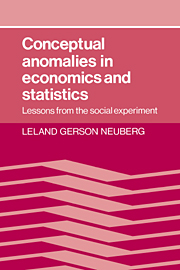Book contents
- Frontmatter
- Contents
- Preface
- Introduction
- PART I STATISTICAL LOGICS
- PART II ECONOMIC LOGICS
- Chapter 5 Problems with a rationalist account of classical mechanics
- Chapter 6 Microeconomics striving to be a classical-mechanics–like science
- Chapter 7 The income maintenance experiments: microeconomic science or scientism?
- Chapter 8 Microeconomics striving to be deontology
- Summary and conclusion of Part II
- Conclusion: Some possible barriers to controlled social experiments as science
- Appendix: Proofs of theorems, lemmas, and propositions
- References
- Symbols and abbreviations
- Index
Summary and conclusion of Part II
Published online by Cambridge University Press: 16 February 2010
- Frontmatter
- Contents
- Preface
- Introduction
- PART I STATISTICAL LOGICS
- PART II ECONOMIC LOGICS
- Chapter 5 Problems with a rationalist account of classical mechanics
- Chapter 6 Microeconomics striving to be a classical-mechanics–like science
- Chapter 7 The income maintenance experiments: microeconomic science or scientism?
- Chapter 8 Microeconomics striving to be deontology
- Summary and conclusion of Part II
- Conclusion: Some possible barriers to controlled social experiments as science
- Appendix: Proofs of theorems, lemmas, and propositions
- References
- Symbols and abbreviations
- Index
Summary
We began Chapter 5 by acknowledging the serious difficulties Thomas Kuhn and others have raised for Karl Popper's rationalist reconstruction of science as testing the deduced consequences of theories against observations. Nevertheless, we claimed that an account of classical mechanics along Popper's lines, together with a catalogue of the account's difficulties, would be useful in exploring the question, Is microeconomics science? We argued that since classical mechanics is science, reasons to believe that microeconomics is not science might be found among differences in the catalogues of difficulties of Popper-like reconstructions of the two theories. Our reconstruction of classical mechanics generated a catalogue of seven difficulties: Laws are not logically falsifiable; approximation conventions are needed in prediction statements; circular-like reasoning is entailed; complicated (or even intractable) equations of motion must sometimes be solved; the values of constants are not implied by the theory; the theory's realm of applicability is not always fully observable; scientists' reporting may be imperfect.
We began Chapter 6 by challenging the view that recent work in the philosophy of science offers an affirmative answer to the question, Is microeconomics science? The implicit logic of that view is incoherent: Popper's model of science fails to account for both physics and economics; physics is science, and therefore economics is science too.
- Type
- Chapter
- Information
- Conceptual Anomalies in Economics and StatisticsLessons from the Social Experiment, pp. 283 - 286Publisher: Cambridge University PressPrint publication year: 1989

